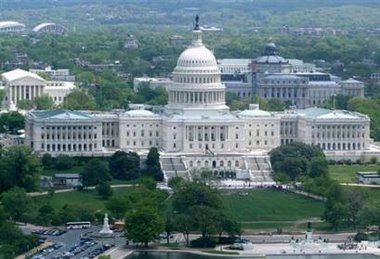What if Democrats Win? Spotlight on the Budget
By Peter Cohn, CongressDaily© National Journal Group Inc.Monday, Oct. 16, 2006
This is the first in a series of articles exploring the impact on key committees and issues if Democrats win control of the House and Senate in November’s elections.
If Democrats take over one or both chambers next year, they say they would seek a return to balanced budgets within the next decade. They say that goal can be achieved even with higher domestic spending -- if combined with more modest tax-cut policies and a return to the "pay as you go" budget enforcement rules from the 1990s. Reinstatement of lapsed pay/go rules would require tax-cut extensions to be deficit neutral, posing a hurdle for some of President Bush's signature policies and likely pushing him to use his veto pen more often.
This is the first in a series of articles exploring the impact on key committees and issues if Democrats win control of the House and Senate in November’s elections.
If Democrats take over one or both chambers next year, they say they would seek a return to balanced budgets within the next decade. They say that goal can be achieved even with higher domestic spending -- if combined with more modest tax-cut policies and a return to the "pay as you go" budget enforcement rules from the 1990s. Reinstatement of lapsed pay/go rules would require tax-cut extensions to be deficit neutral, posing a hurdle for some of President Bush's signature policies and likely pushing him to use his veto pen more often.
"There may be some tax cuts that go to the wealthiest among us that are going to have to get trimmed [when they expire], because you know we have to pay our bills," says Senate Budget ranking member Kent Conrad, D-N.D. Democrats would continue middle-income tax cuts expiring in 2010, as well as preventing the alternative minimum tax from ensnaring more middle-class taxpayers and extending some business-friendly provisions such as the research and development credit. This year, for example, House Budget ranking member John Spratt, D-S.C., proposed $150 billion in tax cuts in his budget blueprint, paid for by closing the "tax gap" between what is owed and what is paid -- which the IRS estimates to be around $350 billion. Less certain is the fate of tax cuts geared to wealthier taxpayers, such as lower rates on capital gains and dividends, also expiring in 2010. "There may be some tax cuts that go to the wealthiest among us that are going to have to get trimmed [when they expire], because you know we have to pay our bills," Senate Budget ranking member Kent Conrad, D-N.D., said last month.
Democrats also would increase domestic spending across the board to keep pace with inflation, while continuing robust military budgets. Army readiness would be a key theme. House Appropriations ranking member David Obey, D-Wis., and Defense Appropriations ranking member John Murtha, D-Pa., argue that not since the end of the Vietnam War has the service been as ill-prepared for war. Added emphasis would be also be put on homeland security, with funds likely increased for security at the nation's 361 seaports, a top priority of Senate Appropriations ranking member Robert Byrd, D-W.Va. While overall spending would get a boost, Democrats say they will subject federal agencies to more scrutiny. When Obey was Appropriations chairman in 1994, he eliminated or cut 123 programs, his staff notes. There would be more oversight and hearings -- and fewer local earmarks.
There also would be a return to 10-year budget projections in the annual budget resolution, to show longer-term impacts of spending and tax policies. In the House, Democrats might end the practice of avoiding a separate vote to hike the statutory debt ceiling upon adoption of the budget resolution. They would ensure that the end result of the "reconciliation" process -- the creation of filibuster-proof tax and mandatory spending bills -- is a net reduction in the deficit. By contrast, Republicans used reconciliation in 2005-06 to pass a $70 billion tax-cut bill and a $40 billion spending-cut bill -- adding $30 billion to the deficit.
There also would be a return to 10-year budget projections in the annual budget resolution, to show longer-term impacts of spending and tax policies. In the House, Democrats might end the practice of avoiding a separate vote to hike the statutory debt ceiling upon adoption of the budget resolution. They would ensure that the end result of the "reconciliation" process -- the creation of filibuster-proof tax and mandatory spending bills -- is a net reduction in the deficit. By contrast, Republicans used reconciliation in 2005-06 to pass a $70 billion tax-cut bill and a $40 billion spending-cut bill -- adding $30 billion to the deficit.
With Democrats in control, Bush would be hard-pressed to push his proposals for Social Security and Medicare spending. Social Security overhaul is a nonstarter with most Democrats. While both parties acknowledge future Medicare obligations outstrip the government's ability to pay, the Bush administration mostly wants to trim payments to hospitals, home health providers, skilled nursing facilities and other beneficiaries. Democrats want to find savings through cuts to insurer subsidies and to allow HHS to negotiate lower drug prices, for example.






No comments:
Post a Comment